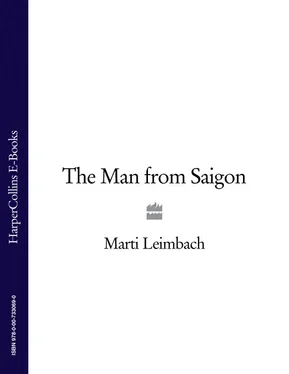I keep thinking that somebody is just there, or there , she wrote, then indicated the treeline, watching us and deciding exactly when to shoot and which one of us to shoot first.
Marc sat with his legs folded, knees bent, his shirt loose around his neck. His utilities had a tear in the pocket from overstuffing them with TV batteries and cables. Through the hole, she could see the white skin of his thigh, a strong contrast to the brown of his arms, his hands. He shook his head, dismissing her fear.
It’s like a movie in my head , she wrote. How do I make it stop?
He got her to play a game in which he wrote a line from a song and she had to guess the song. Then another game in which you filled up boxes on a hand-sketched grid. He drew her away from her thoughts. He wrote, You’re beautiful.
They played hangman and he wrote out PEACE.
She thinks how far away he seems now, belonging to another time. She recalls his face, his dark hair with a crown in front so that if he cuts it too short it sticks straight up. The war had produced a few early gray hairs that clustered by his temples, some new lines by his eyes from squinting in the sun. She has known him six months and in six months he has become far too important to her. She blames the tide of her affections on the war, too. It seemed to transform everything to extremes.
“Here, look! Look, you!” It is the soldier with the sword. He is frustrated because her thoughts have drifted. He commands her attention again as a pesky younger brother might. A younger armed brother, she reminds herself, and nods quickly at the soldier and his sword, indicating she is paying attention. “This is very sharp,” he says, and holds the dark sharp edge near her palm. He wants her to admire the blade, which he has honed to a thin, lethal plane; the handle which allows a strong grip. She looks down at it, but will not touch it. It is how Marc would behave, unimpressed, a little bored. Along with the sprinkling of gray hair, Marc has also acquired here in Vietnam a bold, incautious wit that she is able to assume at times, as though having been with him so much she has assimilated this part of him.
“What you think?” says the soldier. He looks proudly at the sword, holding it up in front of him.
“I think you could use it to shave,” she says. “That is, if you ever needed to.”
The soldier nods, unsure of her meaning.
In Saigon she had become accustomed to sudden violence, expected but nonetheless surprising. People speculated; there wouldn’t be anything today, or this week, or until such-and-such a time. She walked the streets with reporters in tiger suits—their canteens and cameras and tape recorders strapped on to them, some holstering pistols—and just in front of them would be civilian women on their way to a tennis game, looking sporty and white, like women in country clubs all over America. The expats ate lavishly, whatever else was going on; the best restaurants were run by Corsicans, the best clubs by Vietnamese women. A restaurant on the Binh Loi Bridge was blown up—partially blown up—not once, but three different times and still they gathered there because of its position along the river and because it was built on stilts and was therefore irresistible for at least a single visit. Once, while between courses at another restaurant near by, she pointed out the window to where she swore she saw a VC soldier. Her companion, Marc’s cameraman, Don Locke, said, Yeah, wouldn’t surprise me , and asked the waiter for more fish sauce for his chiko rolls. She tried not to worry. The magazine liked her stories; they wanted more. Her editor cabled her to tell her she could sell her combat pieces elsewhere if they couldn’t use them. Locke ate his chiko rolls. She thought, Maybe I’m just seeing things.
And (mostly) she did not worry. Few reporters were wounded, fewer killed. What were the chances? The tennis players rode in their air-conditioned elevators; French women sunbathed at the sports club, lying on their backs and squinting up at the F-100s soaring overhead. The helicopters dove low so that they could see the bathers, who rolled on to their backs and waved with their fingers. These women weren’t afraid. They pointed their breasts to the unseen pilots above, smiling as though to a friend. Vietnamese officers’ wives had grand social schedules. For them, Saigon was one big party. She became friendly with a girl named Nicola, who was having a longstanding affair with a lieutenant colonel who’d re-upped twice just to stay near her, and who frequently flew her to his base for parties. Hippies traveled from around the world just to check the place out. No one thought they were taking risks. And when they went home they told their stories, exaggerating all the dangers that they never themselves truly believed.
“Son, I’m so scared,” she whispers now. She is in a hammock, he is on the ground. Even at night the jungle smells like a stagnant pond. Tonight, the world around her is so black she cannot tell if her eyes are open or shut. It is difficult to assume a relaxed expression or focus her gaze normally. Her vision seeks a destination and she finds herself straining to see in the darkness so that she has to blindfold herself with her hands. She wonders if they will kill them in their sleep, why they haven’t killed them already, why they haven’t let them go. She doesn’t know anything, she despairs, not even if her eyes are closed. It seems unfair, all this confusion.
The guards take turns sleeping. The one on duty sits as though in a trance and may be asleep; he has not moved in at least an hour, though time is distorted now and she cannot honestly tell. He has not moved anyway.
Nothing makes sense. In the morning they will either be killed or get up and march. She doesn’t know why she should die, or why they are marching, because she has no idea where they are heading anyway. Perhaps the Vietcong soldiers are lost. They certainly seem unable to find their unit. They are as stranded and alone as she and Son, but it is they who have the weapons.
“I’ve had enough,” she says now, a phrase she might have used about a bad phone line, no seat on the bus.
From Son comes a whining noise, like that of a dog, and when she hears it she realizes he has, indeed, been listening, noticing, that he has not been nearly so removed as he appeared all day. She feels his hand on her back through the thin material of the hammock, and with that touch she becomes calmer, more solid in herself. He rubs his palm in a short circular motion, then leaves it still for a long time. She cannot remember anything being so comforting. She’d like to reach to him, but dares not. It is the first time—the only time—he has touched her.
She met Son in a hospital in Pleiku about a week after her arrival in the country. He’d come in from the bush with a bunch of soldiers from the 4th Division, his lip cut, the blood all down his shirt, making the green cotton black. The lip looked awful, swollen so that he appeared to be pushing it out like a pouting child. It was the end of the day now and he was arguing with a nurse that he didn’t need any stitches, just give him a needle and thread; he’d do it himself. He claimed he’d stitched himself before in the field and it hadn’t even gotten infected. Please , he said as the nurse clasped his chin. Ah do it!
The nurse held his jaw in her hand, dabbing iodine on his face. Don’t move, Tarzan! she said.
Da nun show may! he said. He was a scrapper; he never stopped talking.
Why’re you moving so much? You want to split that lip worse? The nurse had her eye on his lip, squinting into it as though down a scope glass. She was angling his face for better light. On her smock was her name, Tracy Flower, sewn neatly in what might have been the same stitch being applied now to Son’s lip.
Читать дальше












